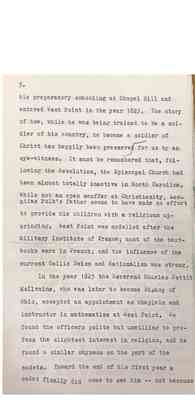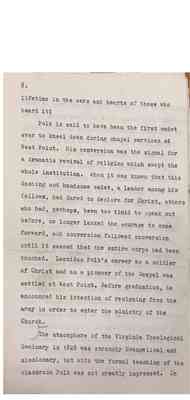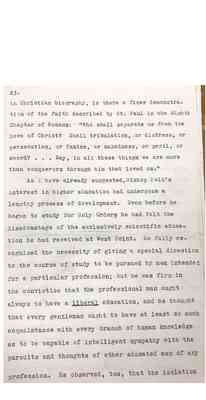Pages That Mention West Point
Polk Family Papers Box 1 Document
6
-5-
his preparatory schooling at Chapel Hill and entered West Point in the year 1823. The story of how, while he was being trained to be a soldier of his country, he became a soldier of Christ has happily been preserved for us by an eye-witness. It must be remembered that, following the Revolution, the Episcopal Church had been almost totally inactive in North Carolina. While not an open scoffer at Christianity, Leonidas Polk's father seems to have made no effort to provide his children with a religious upbringing. West Point was modelled after the Military Institute of France; most of the textbooks were in French; and the influence of the current Gallic Deism and Rationalism was strong.
In the year 1825 the [Reverend Charles Pettit McIlvaine]], who was later to become Bishop of Ohio, accepted an appointment as chaplain and instructor in mathematics at West Point. He found the officers polite but unwilling to profess the slightest interest in religion, and he found a similar shyness on the part of the cadets. Toward the end of his first year a cadet finally did come to see him -- not because
9
-8-
lifetime in the ears and hearts of those who heart it!
Polk is said to have been the first cadet ever to kneel down during chapel services at West Point. His conversation was the signal for a dramatic revival of religion which swept the whole institution. When it was known that this dashing and handsome cadet, a leader among his fellows, had dared to declare for Christ, others who had, perhaps, been too timid to speak out before, no longer lacked the courage to come forward, and conversion followed conversion until it seemed that the entire corps had been touched. Leonidas Polk's career as a soldier of Christ and as a pioneer of the Gospel was settled at West Point. Before graduation, he announced hhis intention of resigning from the army in order to enter the ministry of the Church.
The atmosphere of the Virginia Theological Seminary in 1828 was strongly Evangelical and missionary, but with the formal teaching of the classroom Polk was not greatly impressed. In
24
-23-
in Christian biography, is there a finer demonstration of the faith described by St. Paul in the Eighth Chapter of Romans: "Who shall separate us from the love of Christ? Shall tribulation, or distress, or persecution, or famine, or nakedness, or peril, or sword? ... Nay, in all these things we are more than conquerors through him that loved us."
As I have already suggested, Bishop Polk's interest in higher education had undergone a lengthy process of development. Even before he began to study for Holy Orders he had felt the disadvapntage of the exclusively scientific education he had received at West Point. He fully recognized the necessity of giving a special direction to the course of study to be pursued by men intended for a particular profession; but he was firm in the conviction that the professional man ought always to have a liberal education, and he thought that every gentleman ought to have at least so much acquaintance with every branch of human knowledge as to be capable of intelligent sympathy with the pursuits and thoughts of other educated men of any profession. He observed, too, that the isolation
Polk Family Papers Box 1 Document 10
1
"THE EPISCOPALIAN" September 1976
{begin clipping} {image of Polk} Bishop-General Leonidas Polk of Louisiana "sympathized so ardently with the rebel leaders that he was induced in an evil moment to resign his bishopric and accepted from Jeff Davis a commission in the rebel army as Major-General." Reports at the time said since Bishop Polk became a soldier, he "doffed the decent manners of the episcopate for the habits of a trooper - that he drinks, swears, etc., etc." But he baptized three generals on the battlefield. {end clipping}
{begin clipping} {image of Polk} LEONIDAS POLK
Throughout the South, Asheville was regarded a secure haven. Wounded officers came here to convalesce. Here elements of Jeb Stuart's cavalry revived their gay spirits, played banjos, and rested their jaded horses. Here Lieutenant General Leonidas Polk sent his wife for safety after he dropped the bishop's frock and put on the gray uniform to campaign with the Army of Tennessee until shot down in front of Kenesaw Mountain. {end clipping}
{begin stamp} THE MOBILE REGISTER MOBILE, ALA. D. 43,516 SUN. 41,476
MAY 3 1969 B[ritelle's?] {end stamp} {begin clipping} Relics Are Displayed At Meeting Of UDC
Items presented to the Jefferson Davis Chaper, United Daughters of the Confederacy, were displayed at the meeting yesterday at the home of Mrs. H. Abb Woolridge.
Old UDC pins and a prisoner's pass issued in 1865 were given to the chapter by George Arras through Mrs. Martin Breisten. These included a Robert E. Lee lapel pin, a pin from a state UDC reunion held in Mobile Nov. 15-16, 1904; and a pin from a Washington, D.C. convention in April 1905, issued in memory of Confederate soldiers.
The pass was issued from the office of the provost marshal in Selma on May 20, 1865, to Union Captain William S. Taylor, a paroled prisoner by order of Brig. Gen. C. O. Andrews. The pass was signed by George C. Evanston, captain and provost marshal.
Mrs. Ernest C. Edgar Jr., presented the program, "The Fighting Bishop General Leonidias Polk, CSA." She said that Bishop Polk graduated from West Point Academy in 1827 and resigned his cavalry lieutenant's commission to enter the Virginia Theological Seminary. He was ordained a deacon in the Protestant Episcopal Church in 1830.
In 1860 the bishop laid the cornerstone for the University of the South at Sewanne, Tenn., "the reality of his dreams and labors."
At the age of 51, Bishop Polk put aside his robes to wear the gray and fight with the Confederacy. Mrs. Edgar said his special duty was to defend the Mississippi River and that he was killed in action atop Pine Mountain, Ga., while viewing an enemy location."
Mrs. Howard M. Wheeler was a guest.
{end clipping}
Polk Family Papers Box 1 Document 12
1
From THE POINTER File: Leonidas Polk official publication of the cadets at West Point. June 2, 1961
{illustration of a draped Confederate flag with a bible, a cross, and a flat-topped & flat-brimmed hat of the type associated with ministers arranged atop the draped fabric on the left and a sabre, a Cavalry hat with plume arranged on the right}
BISHOP-GENERAL OF THE CONFEDERACY
history By E. T. LECHNER
the rousing tale of leonidas polk, the minister-in-arms, in the story which took first place in the 1961 association of graduates essay contest.
. . . at the landing, are thirty-thee thousand men, Some fairly seasoned in war, but many green sticks, Grant's Army of the Tennessee. Down the river Don Carlos Buell has twenty-five thousand more In the Army of the Ohio. Opposing these Are Albert Sidney Johnston and Beauregard With something like forty thousand butternut fighters Including a martial bishop. ___
The final phrase of Benet's verse strikes a strange note. A bishop in the battlefield? How come a clergyman to the blood-soaked fields of Shiloh? Who was this figure, called by his men simply "the Bishop?" It was he who, when the massed forces of a divided country met at Shiloh, advanced with sword drawn to lead personally his gray-clad followers in four gallant charges against the Federal blue. It is hard to make "Reverend" rhyme with "General", yet the man spoken of in the verse did that - and more. He was a leader of men in two spheres of endeavor, both position demanding exacting qualities of leadership. Not only did he succeed as a soldier and as a minister, but he excelled as both. A graduate of the United States Military Academy and an Alexandria, Virginia seminary, his dual life included service as Episcopal Bishop of Louisiana and Confederate Lieutenant General. His name was Leonidas Polk.
Polk's father, a country gentleman of North Carolina, had been an officer in the Continental Army and a battle companion of Andrew Jackson. Leonidas determined to follow his father's example and began his Army career as a cadet at the Military Academy. His years at West Point were spent under the direct eye of Superindendent Thayer. Young Polk was quick to experience at the Academy what new cadets have confronted for a centery and a half. With the careful tone of reserve which was to prove so characteristic of his later life he wrote to his father,




